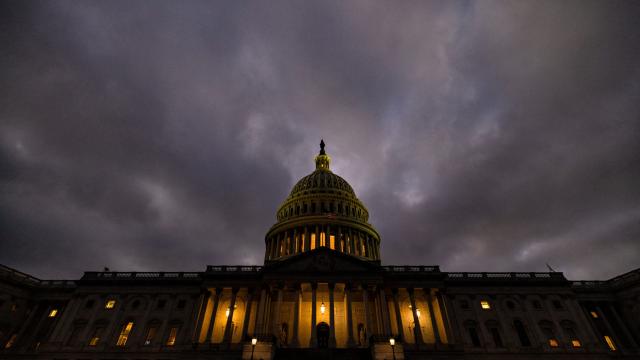“Bipartisan climate policy” is a unicorn of phrases when it comes to Congress, let alone “bipartisan climate policy instructing the Environmental Protection Agency to regulate greenhouse gases.” Yet on Monday, this mythical creature appeared after senators agreed to include a plan to phase down production and use of hydrofluorocarbons, or HFCs, an extremely powerful greenhouse gas, in a year-end spending bill.
The provision was tucked in 3,100+ pages of the year-end omnibus bill to keep the government’s lights on. It’s one of a handful of climate provisions that include $US35 ($46) billion of funding for clean energy and carbon capture R&D over 10 years, money for the Weatherization Assistance Program, the original WAP, and an extension of renewables tax credits. But the HFC phaseout may be the most significant inclusion, since it directly tackles a dangerous greenhouse gas that needs to be reigned in ASAP.
HFCs have up to 11,700 times the warming potential of carbon dioxide. They were made as a replacement for refrigerants that were destroying the ozone hole, but clearly no good deed goes unpunished. Earlier this year, the United Nations scientists warned that failing to address HFC emissions would result in us “essentially cooking ourselves.” The new bill — which could come to a vote late on Monday along with a coronavirus relief package — aims to turn the broiler down.
It directs the EPA to create a rule and oversee a program to reduce HFCs produced and used in the U.S. to 15% below 2011-13 levels by 2035. If passed, it would basically be the first new climate legislation in more than a decade to clear Congress. The timeline for reduction laid out is in line with the Kigali Amendment, a global agreement signed to phase down hydrofluorocarbons. The U.S. was part of negotiating that agreement in the Obama years but then promptly ignored it in the Trump years. That’s despite there being bipartisan support, because it could both help cool the planet and create jobs.
The Kigali Amendment is forecast to lower the planetary heat by 0.7 degrees Fahrenheit (0.4 degrees Celsius) if implemented. While the U.S. isn’t officially a party to the agreement, the government now has a plan to meet the goals outlined in it. The HFC phase-out picked up steam in September after spending months in a liminal space, followings its introduction by the bipartisan duo of Sen. Tom Carper and Sen. John Kennedy in late 2019. Republicans led by Sen. John Barrasso, the chairman of the Senate Committee on Environment and Public Works, threatened to block the HFC part of an energy bill in March. The bill never made it to the floor. But work continued behind the scenes, and in September, Barrasso came around to the amendment.
“Fortunately, there are solutions to these problems that will clean our air, protect, and create American jobs, and help to save our planet from the climate crisis,” Sen. Carper said in a statement.
[referenced id=”1525040″ url=”https://gizmodo.com.au/2020/10/how-a-biden-administration-could-fight-climate-change-without-the-senate/” thumb=”https://gizmodo.com.au/wp-content/uploads/2020/10/31/acgslwfq68unn9hbbu7l-300×169.jpg” title=”How a Biden Administration Could Fight Climate Change Without the U.S. Senate” excerpt=”Somewhere between a dream and nightmare is this scenario for Jan. 20, 2021: Joe Biden becomes president, while the Senate remains in Republican control.”]
Indeed, in addition to benefiting the climate, companies could create an estimated 33,000 jobs in the U.S. to manufacture less-harmful replacements for HFCs and safely destroy appliances. It also creates more regulatory certainty — something refrigerant manufacturers have been asking for — as more and more states implement HFC phase downs.
“This agreement to phase down HFCs marks a major victory in this difficult political environment for those of us fighting the climate crisis,” Senate Minority Leader Chuck Schumer said in an emailed statement. “We’ve accomplished this with a climate and science denying Republican president and a Republican party largely beholden to industry. But let’s be clear: is this HFCs phase down enough to meet the demands of the science? No. But is it a significant step in the right direction? Yes.”
Indeed, HFCs are incredibly harmful to the climate, but they represent a sliver of all greenhouse gas emissions. Transportation, agriculture, and electricity all generally rely on fossil fuels and represent a much larger chunk of carbon pollution that needs to be phased out as well. The $US35 ($46) billion in spending in the omnibus and relief packages is a pittance of what’s needed. Aggressively pursuing a phase-out of all emissions across all sectors of the economy similar to the HFC one would likewise generate jobs and preserve a habitable biosphere. Despite that, Republicans are still mired in a morass of climate denial, industry subservience, and delay.
While it’s possible there could be a few other areas where bipartisan climate policy could happen, the chances of those actually occurring should Republicans retain the Senate under Majority Leader Mitch McConnell are slim to none. That what makes the Georgia runoffs so vital — and why President-elect Joe Biden should be ready to wield the full power of the pen if Democrats don’t win them.
